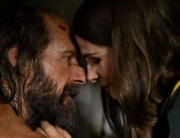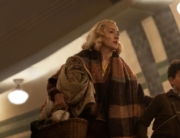In this sprawling historical drama, a solemn white man in the Confederate South, Newton Knight (Matthew McConaughey), fights for his freedom and that of his black allies. It seems, in other words, carefully engineered to win as many Oscars as possible, yet there are many reasons to see it nonetheless. The film sheds light on a fascinating and often-forgotten part of Civil War history: the story of Southern Unionists. It also has almost enough brutal action, wrenching emotional drama, and satisfying moral certitude to justify its 139-minute running time. Almost.
Knight begins his journey as a medic in the Confederate Army, dodging between trenches and cannon blasts to save the poor young men caught up in the fray. He has no love for the Confederate cause, remarking that he doesn’t want to “fight for another man’s cotton.” Before long, he’s a deserter, defending the impoverished farmers of Jones County, Mississippi, from tax collectors (read: bandits) and hiding out in a swamp with a band of escaped slaves. Though the film often shies away from the white savior trope, it’s still present at times, curdling the racial politics of the film. Knight literally breaks a man’s shackles, and soon after he proclaims that “everybody’s somebody’s nigger.” While the line makes sense in context, equating the plight of poor farmers to that of black slaves is disingenuous at best.
Soon, they’re joined by a number of other deserters, and together they start to fight back. The film hits its stride during these exceptional battle scenes as the plucky guerrillas stage decisive ambushes and daring sabotages. The Confederates, meanwhile, complicate these victories at every turn, burning farms and hanging whoever they can get their hands on. The violence is gratifying and ugly, and the film revels in the complexity of the conflict.
However, once the fighting’s done, the film finds itself in a plodding morass as the people of the county wrestle with Reconstruction, and there seems to be about five separate endings, with the film diving back in after each conclusion to explore how racism pervades and persists in the postwar South. Bizarrely, it fast-forwards 85 years to find one of Newton’s descendants accused of miscegeny, with only a thematic thread connecting it to the rest of the film.
Much of the latter half is supposed to be grounded in the love between Knight and Rachel (Gugu Mbatha-Raw), an escaped slave. Unfortunately, the two have little to no chemistry, and the film seems uncomfortable with showing any affection between them. They’re married without so much as a kiss, relegating their romance to a few terse conversations and meaningful glances.
Yet despite its flaws, this is a thought-provoking look at Southern history that speaks to our modern struggles with race and class. That resonance might be stronger if the African-Americans were more than bit characters, but this is Hollywood, after all. The ending proves to be the film’s cardinal sin, as no matter how much fire is packed into the first half, the end still leaves the viewer with nothing but flickering coals.

















Leave A Comment